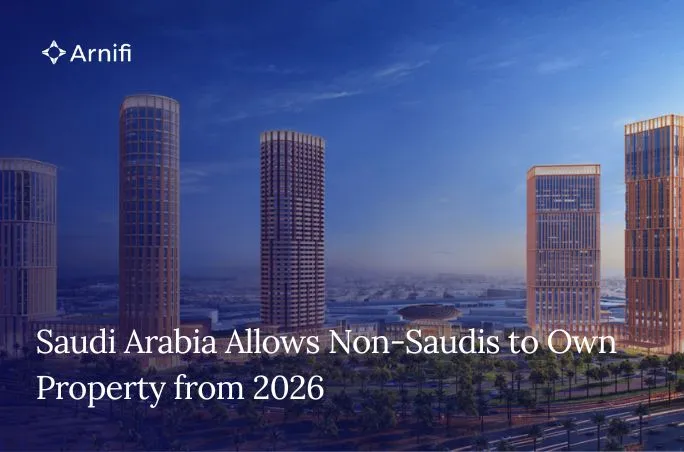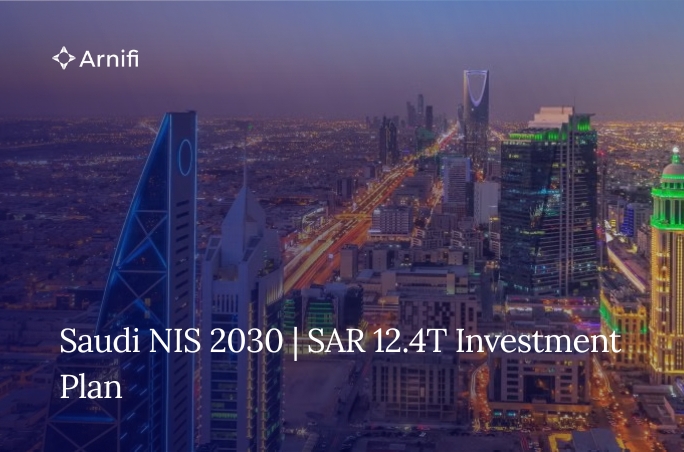Saudi Arabia to Allow Non‑Saudis to Own Real Estate from January 2026
by Ishika Bhandari Nov 15, 2025  6 MIN READ
6 MIN READ

Table of contents
According to these new laws, foreign nationals will be permitted to own land in Saudi Arabia from January 2026. As the landmark change in this area, this law also carries a much greater purpose in the future, part of Vision 2030, to boost foreign investments in the economy, diversify its economy, and fortify its real estate sector.
What the New Law Means
Under the new approved Law of Real Estate Ownership by Non‑Saudis, a wide spectrum of foreign entities and individuals will now become entitled to buy property within the boundaries of Saudi Arabia. Specifically, the law allows:
- Non‑Saudi individuals
- Foreign companies
- Saudi firms with foreign shareholders
- Non-profit organizations
- Diplomatic missions
In order to reinforce regulatory clarity, all foreign-owned properties will have to be registered, and buyers will also be obliged to provide full disclosure of relevant information in the course of acquisition. This is a requirement that, in turn, aids the enforcement of the continued transparency and, therefore, fits within a broader approach of the Saudi Arabian nation within its economic and social policy aspirations.
Location Restrictions and Sensitive Areas
In this case, freedom of ownership will be granted even wider, but tighter rules will continue in relation to Makkah and Madinah, two cities of great religious significance. According to the new regulation, those who have the right to property in certain areas in those two cities can only acquire property rights through Muslims and Saudi companies. The complete map of permissible zones, types of rights, and ownership limits is yet to be published. These regulations will be issued by the Real Estate General Authority (REGA).
REGA anticipates producing this documentation soon, which will provide geographical boundaries stipulating where non-Saudis can acquire property and what portions therein can be owned, and how the process will be managed. Among the anticipated jurisdictions are major cities such as Riyadh, Jeddah, and others throughout the kingdom.
Fees, Taxes & Penalties
The purchase of property is not going to be free of cost for foreign investors. This law establishes a combined fee of 10% that incorporates the declaration taxes on the transaction of property plus administrative fees. Offences against the new law lead to heavy penalties; fines worth 10 million Saudi Riyals can be imposed, and properties insinuated to, built on, or sold under false or misleading information can be confiscated and sold at auction.
Enforcement, Oversight & Governance
The implementation of the law will involve multiple government institutions in its implementation. 13 government entities will participate in overseeing the new system. In addition, REGA will have an advisory committee created to observe the law’s execution and create performance reports and recommendations to amend it.
Importantly, the system is designed to align with other existing regulations, including:
- The Premium Residency (Iqama) system provides privileged conditions for certain non-residents
- GCC cross-border ownership regulations allow property rights to flow more freely within the Gulf Cooperation Council countries
Digital ID Requirement
Non-resident foreigners will have to present a digital ID through the Absher facility, an online portal by the Saudi Ministry of Interior. This digital identity is important before the process of property acquisition: foreign buyers should first obtain this ID, open a Saudi bank account, and have a local phone number. These procedures provide formal and secure entry into the Saudi real estate market.
Economic & Strategic Rationale
Saudi reform is directly part of Vision 2030, the country’s ambitious plan to shift away from oil for about 74% of its GDP and to bring in foreign direct investment (FDI) into the country. Now, by opening the real estate sector to foreign ownership, the government expects to:
- Diversify property supply
- Attract investments from global developers
- Promote job creation in the economy, particularly in real estate and construction
- Facilitate the development of a viable and sustainable long-term urban development pattern
According to Saudi authorities, the balance between foreign investment and the protection of Saudi citizens’ interests has been carefully factored into the law.
What This Means for Investors and Expatriates
The new law brings forward, but more importantly, opens a way for foreign entities and individuals to invest in the Saudi market soon. Here are important points that potential buyers have to look out for:
- Eligibility: Verifies that you fall under the endorsed categories of either individual, company, shareholding, non-profit, etc
- Documentation: Prepare to apply for an Absher digital ID, open a Saudi bank account, and a local number
- Financial Planning: Factor in a 10% charge on transactions and administrative costs
- Risk Management: Know the penalties-misdeclaration can lead to heavy fines or compulsory sale
- Location Strategy: Decide whether to invest in major cities like Riyadh or Jeddah, for potentially undefined zones in the future
- Compliance and Governance: Be aware of an elaborate oversight regime from various regulators, for the system will have centralized monitoring via a formal advisory committee
How Arnifi Can Help
At Arnifi, we have specialized in assisting international businesses and expatriates in compliance with extremely complex regulatory environments, including the landmark developments like the new real property law in Saudi Arabia. Here is how we will help:
- Regulatory Advisory: We keep track of updates coming from the Real Estate General Authority; we can advise on ownership zones, procedural rules, and compliance requirements
- Digital Onboarding: Our team can facilitate you to get your Absher digital ID, open a Saudi bank account, and conclude all the official required formalities
- Investment Structuring: We help you, a foreign individual or Company, efficiently structure your real estate transaction, considering taxes, fees, and legal restrictions involved
- Risk Mitigation: With a long experience in labor and compliance law, we ensure that all disclosures are correct and protect you from potential high-cost penalties
- Long-Term Planning: At Arnifi, we not only partner in acquisition, but we also have long-term estate management-oriented support to take your investment in your business or personal goals
Conclusion
The 2026 law is historically the first opening of Saudi real estate for global investors. The benefits are beyond any doubt, a clearer advantage that includes transparency, regulated ownership, and alignment with Vision 2030, but for non-Saudis, the caution that comes through understanding the realities of restriction, obligations, and enforcement frameworks must be exercised. However, with expert guidance from Arnifi, international buyers can make good use of such an opening and inform their investments accordingly.
Top Saudi Arab Packages

Related Articles
Top Saudi Arab Packages



